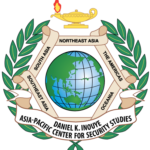Sebastian Kevany
Security Nexus is a peer-reviewed, online journal published by the Daniel K. Inouye Asia-Pacific Center for Security Studies.
The views expressed in the Security Nexus online Journal are those of the author and do not reflect the official policy or position of DKI APCSS, the Department of Defense, or the U.S. Government. The appearance of external hyperlinks does not constitute endorsement by the United States Department of Defense (DoD) of the linked websites or the information, products, or services contained therein. DoD does not exercise any editorial, security, or other control over the information you may find at these sites.
New Courses
Contact Info
1600 Amphitheatre Parkway New York WC1 1BA
Phone: 1.800.458.556 / 1.800.532.2112
Fax: 458 761-9562
Email: info@your-domain.com
Web: ThemeFusion





